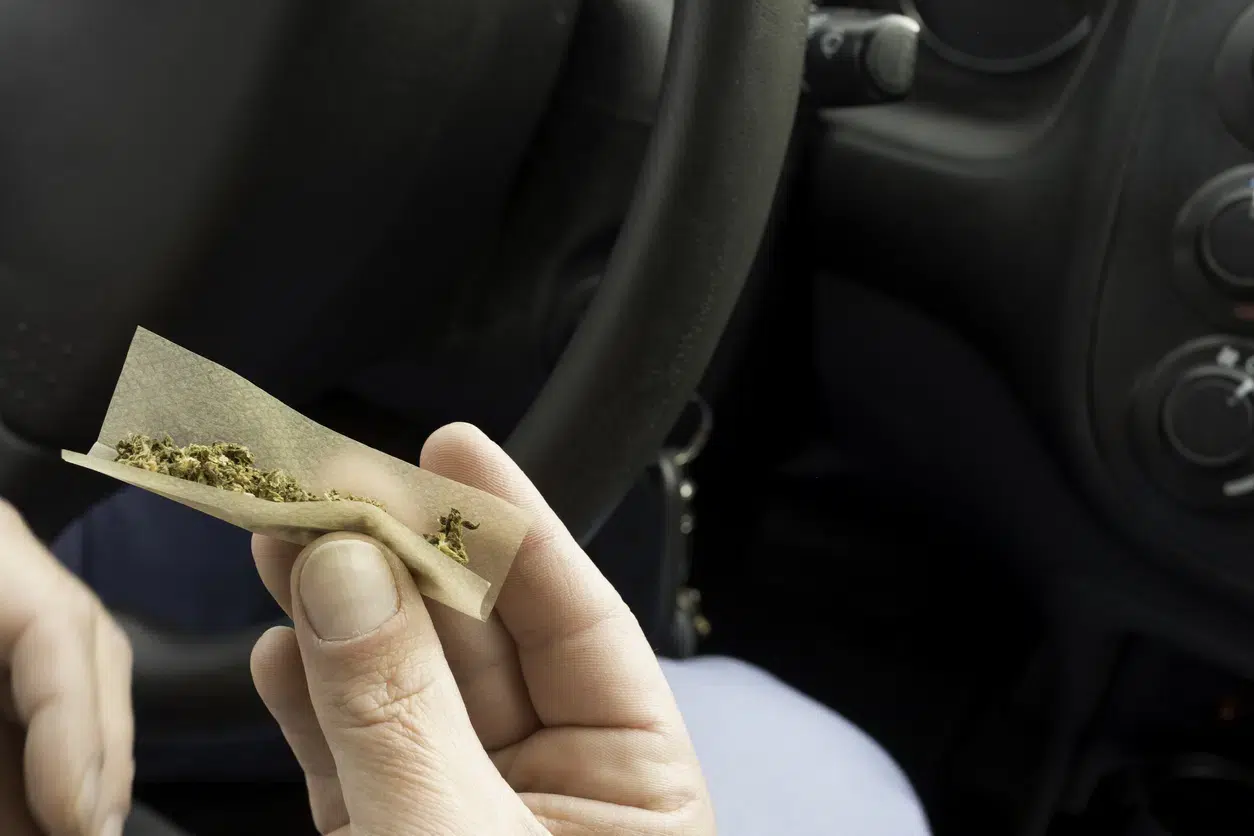Understanding Marijuana DUI Charges in Virginia
Driving under the influence of marijuana in Virginia (DUI for weed) is classified as Driving Under the Influence of Drugs (DUID) under Virginia Code 18.2-266. This law prohibits operating a motor vehicle while impaired by any narcotic drug, including marijuana, to a degree that affects safe driving.
Unlike alcohol, the state doesn’t have a specific THC blood concentration threshold to establish impairment for marijuana. Instead, prosecutors must prove impairment through evidence like driving behavior, field sobriety tests, and blood test results showing active THC. Drivers in Virginia are subject to implied consent laws, meaning they must submit to a blood test if arrested for suspected DUID within three hours of the offense. Refusing a blood test results in a one-year license suspension for a first offense.
You can go to jail and lose your license if convicted of a marijuana DUI offense. Hiring a Fairfax marijuana DUI defense lawyer, such as Scott C. Nolan, early in the legal process is vital to protect your rights.

Marijuana DUI Laws and Law Enforcement Procedures
Driving under the influence of marijuana is illegal under Virginia law, which prohibits operating a motor vehicle while impaired by any narcotic drug, including marijuana, to a degree that impairs safe driving.
Unlike alcohol, which has a defined 0.08% blood alcohol concentration (BAC) limit, Virginia does not have a specific per se THC blood concentration threshold for marijuana-related Driving Under the Influence of Drugs. Instead, prosecutors must prove impairment through evidence such as erratic driving, field sobriety test performance, and blood tests showing active THC, rather than non-psychoactive metabolites, which can remain in the system for weeks.
Virginia’s legalization of recreational marijuana possession (up to 1 ounce for adults 21+ as of July 1, 2021) does not exempt drivers from DUID charges if impaired, including medical marijuana users. Penalties for a first offense include a Class 1 misdemeanor, up to 12 months in jail, a $250–$2,500 fine, a 12-month license suspension, and mandatory participation in the Virginia Alcohol Safety Action Program (VASAP).
Subsequent offenses within 5–10 years result in escalated penalties, including mandatory jail time, higher fines, and longer license suspensions. A third offense within 5 years is classified as a Class 6 felony.
The police must have probable cause before arresting you for DUID. Failure to comply with protocols can result in the dismissal of the charges. A skilled Fairfax marijuana DUI lawyer like Scott C. Nolan can scrutinize how sobriety tests were administered and whether proper legal procedures were followed.
Challenges in Proving Marijuana Impairment
Marijuana affects everyone differently, and current testing does not always measure if a person is impaired. Field sobriety tests (FSTs), such as the walk-and-turn or one-leg stand, are commonly used by Virginia law enforcement to assess impairment during a traffic stop. However, these tests are less reliable for detecting marijuana impairment than alcohol, as noted by studies like those from the National Institute of Justice. Marijuana affects motor skills, coordination, and cognition differently than alcohol, and symptoms like bloodshot eyes or slowed reaction times can be caused by other factors.
The lack of validated, marijuana-specific FSTs means officers’ observations are subjective and open to challenge in court by skilled defense lawyers. Attorney Nolan often argues on DUID cases that poor FST performance does not conclusively prove marijuana-related impairment, especially without corroborating evidence like erratic driving or strong behavioral indicators.
Furthermore,Virginia’s implied consent law requires drivers arrested for suspected DUID to submit to a blood test within three hours; refusal leads to a one-year license suspension. However, interpreting blood test results for marijuana is challenging.
Blood tests can detect active THC and its metabolites, but the level of THC does not directly correlate with impairment, unlike BAC for alcohol. Factors like individual tolerance, frequency of use, and metabolism vary widely, meaning a low THC level might impair a novice user but not a regular one.
Prosecutors often rely on expert testimony from toxicologists to interpret results. Still, defense attorneys can challenge the reliability of these interpretations, the accuracy of testing equipment, or the chain of custody for blood samples. Errors in testing procedures or delays in sample collection can further weaken the prosecution’s case.
A knowledgeable defense attorney like Attorney Nolan can challenge the scientific reliability of test results and the credibility of officer observations of your alleged impairment by marijuana.
Effective Defense Strategies for Marijuana DUI Cases
A primary defense strategy in Virginia DUI for weed cases is to challenge the legality of the initial traffic stop. Law enforcement must have reasonable suspicion or probable cause, such as erratic driving or a traffic violation, to stop your vehicle.
Since 2021, the smell of marijuana alone cannot justify a stop or search, though the odor of burnt marijuana can contribute to probable cause for a DUID investigation. Defense attorneys scrutinize whether the officer had a valid reason for the stop, such as a traffic infraction or observable impairment. If the stop lacks sufficient justification, the evidence obtained may be deemed inadmissible in court, potentially resulting in the dismissal of the case.
Questioning Field Sobriety Test Reliability
Defense attorneys may cross-examine officers on their FST training, the test conditions, or the subjective nature of their observations, such as bloodshot eyes or slurred speech, which could have alternative explanations unrelated to marijuana use.
Disputing Blood Test Evidence
Blood tests are critical in Fairfax DUID cases due to the state’s implied consent law, which mandates a test within three hours of arrest or faces a one-year license suspension. However, blood test evidence is vulnerable to challenges. Attorneys can question the accuracy of the testing process, including the calibration of equipment, the qualifications of the lab technician, or the chain of custody for the sample.
Since Virginia lacks a per se THC limit, prosecutors must prove impairment, not just the presence of THC. Attorney Nolan may argue that detected THC levels (especially low amounts) do not indicate impairment at the time of driving, as active THC dissipates quickly, and metabolites can linger for weeks. Expert testimony from a toxicologist hired by the defense can counter the prosecution’s interpretation, highlighting individual differences in tolerance or metabolism.
Arguing Lack of Impairment Evidence
- A popular defense is asserting that the prosecution failed to prove impairment beyond a reasonable doubt. Unlike alcohol DUIs, where a 0.08% BAC establishes a presumption of impairment, marijuana DUIs rely on a combination of driving behavior, officer observations, FSTs, and blood tests. If evidence is weak, your defense attorneys can argue that you were not impaired. This is particularly effective for legal marijuana users who may have trace THC in their system from prior use. Your defense attorneys may also highlight procedural errors, such as delays in blood testing that affect THC accuracy, or challenge the officer’s failure to rule out other causes of observed behavior, like fatigue or prescription medication.
A skilled Fairfax marijuana DUI lawyer may use any of these defenses to argue that you aren’t guilty of this serious crime.
Penalties and Long-Term Consequences of a Marijuana DUI Conviction
A marijuana-related DUID conviction carries significant penalties, treated similarly to alcohol-related DUIs. A first offense is a Class 1 misdemeanor, punishable by up to 12 months in jail, a fine of $250–$2,500, a mandatory 12-month driver’s license suspension, and required participation in the Virginia Alcohol Safety Action Program, which includes education and potential treatment.
Jail time is often suspended for first offenders unless aggravating factors, such as a crash or high impairment level, are present. A second offense within 5 years mandates a minimum $500 fine and 20 days in jail; within 5–10 years, 10 days in prison, with a 3-year license suspension.
A third offense within five years escalates to a Class 6 felony, with a mandatory fine of $1,000, 90 days in jail, a potential sentence of up to five years in prison, an indefinite license suspension, and possible vehicle seizure. A fourth or subsequent offense within 10 years is a felony, carrying a mandatory fine of $1,000, a prison term of up to 1 year, and an indefinite license suspension. Additional penalties apply for aggravating factors, such as a DUI with a minor under 17, which adds a $500 fine and 5 days in jail.
A marijuana DUI conviction in Virginia has lasting impacts beyond immediate penalties. A criminal record, even for a misdemeanor, can affect employment prospects, especially in fields requiring background checks or professional licenses, as employers may view a DUI as evidence of poor judgment.
The license suspension disrupts daily life, limiting access to work, school, or other obligations, and Virginia’s restricted license options are limited, often requiring proof of necessity and compliance with VASAP. Insurance premiums typically increase significantly, as insurers classify DUI offenders as high-risk, with rate hikes lasting 3–5 years or more.
Hiring a Fairfax marijuana DUI lawyer, such as Attorney Nolan, can help minimize these consequences or, in some cases, avoid them entirely.

Why You Need a Fairfax Marijuana DUI Defense Lawyer
Always retain a skilled Fairfax marijuana DUI lawyer if you are arrested for DUID. Here’s why:
- Complexity of Proving Impairment: Virginia lacks a per se THC blood concentration limit for marijuana-related Driving Under the Influence of Drugs under state law. Your skilled criminal law attorney can challenge the prosecution’s evidence, such as blood test results or field sobriety tests, which are less reliable for marijuana than alcohol, to argue that impairment wasn’t proven beyond a reasonable doubt.
- Challenging the Traffic Stop: Since 2021, the smell of marijuana alone cannot justify a stop or search. Skilled criminal defense attorney Scott C. Nolan can scrutinize the legality of the traffic stop, ensuring officers had valid probable cause, and move to suppress evidence if the stop was unlawful.
- Addressing Blood Test Evidence: Blood tests required under Virginia’s implied consent law are critical but prone to errors in collection, analysis, or chain of custody. A lawyer can challenge the accuracy of THC measurements or argue that low THC levels don’t indicate impairment, leveraging expert testimony to counter prosecution claims.
- Mitigating Harsh Penalties: A first-offense DUID carries a potential sentence of up to 12 months in jail, a fine of $250–$2,500, a 12-month license suspension, and mandatory participation in VASAP. Repeat offenses escalate to felonies with mandatory jail time. A lawyer can negotiate plea deals or seek reduced penalties, especially for first offenders.
- Protecting Your Long-Term Interests: A conviction leads to a criminal record, increased insurance rates, employment challenges, and potential loss of civil rights for felony convictions. Attorney Nolan can minimize these impacts by fighting for dismissal or lesser charges, preserving your reputation and future opportunities.
- Exploiting Procedural Errors: Mistakes in police procedure, such as improper administration of field sobriety tests or delays in blood testing, can weaken the prosecution’s case. A skilled criminal defense lawyer identifies and leverages these errors to challenge evidence admissibility.
- Skill in Court and Negotiation: DUID cases require specialized knowledge of Virginia’s DUI laws and local court practices. A Fairfax marijuana DUI attorney with experience can navigate complex legal processes, cross-examine toxicologists, and negotiate with prosecutors to achieve the best outcome.
You can count on our skilled Virginia trial attorney to fight for your rights in your DUID case. Attorney Nolan offers a free consultation to review your case.
Fairfax Marijuana DUI Attorney FAQs
A marijuana DUI in Virginia occurs when a driver operates a vehicle while impaired by marijuana to the point that it affects their ability to drive safely. Unlike alcohol DUIs, there is no specific legal THC limit, so impairment is often based on officer observations and chemical test results.
Penalties for a marijuana DUI can include jail time, fines up to $2,500, driver’s license suspension for one year, mandatory substance abuse education, and installation of an ignition interlock device if convicted.
Virginia law enforcement may use blood tests to measure THC concentration and rely on field sobriety tests or observations by Drug Recognition Experts (DREs). However, THC levels do not always accurately reflect impairment.
An alcohol DUI is typically based on a measurable blood alcohol concentration (BAC) of 0.08% or higher, while marijuana DUIs rely on subjective observations and blood test results. Marijuana impairment can be harder to prove due to how long THC stays in the body.
No. Virginia does not have a defined per se THC limit like the BAC standard for alcohol. Prosecutors must prove that marijuana use actually impaired the driver’s ability to operate a vehicle safely.
A Fairfax marijuana DUI attorney can challenge the validity of blood tests, question the reliability of officer observations, and dispute the accuracy of DRE testimony. Defense strategies may also include arguing that THC presence does not equal impairment.
DRE testimony can be subjective and sometimes unreliable. A skilled defense lawyer can cross-examine the DRE’s qualifications, testing procedures, and conclusions to weaken the prosecution’s case.
Probable cause may include erratic driving, the odor of marijuana, physical signs of impairment, or failed field sobriety tests. However, these indicators can be challenged as subjective or insufficient.
A first offense can result in up to 12 months in jail, a fine of up to $2,500, a one-year driver’s license suspension, and mandatory completion of the Virginia Alcohol Safety Action Program (VASAP).
THC can remain detectable in the bloodstream for hours or even days after use, long after the effects have worn off. This makes it difficult for prosecutors to prove active impairment at the time of driving.
Virginia’s implied consent law requires drivers arrested for DUI to submit to chemical testing. Refusal can lead to an automatic one-year license suspension and separate penalties, even without a conviction.
A conviction results in an automatic one-year suspension of driving privileges. In some cases, you may be eligible for restricted driving privileges after enrolling in VASAP.
Yes. Even with a valid medical marijuana card, it is illegal to drive while impaired. The legality of possession does not excuse driving under the influence.
An experienced attorney can review the evidence for weaknesses, file motions to suppress illegally obtained evidence, negotiate plea deals, and represent you in court to minimize or dismiss the charges.
Scott Nolan has extensive experience defending DUI and drug-related cases in Fairfax and across Northern Virginia. His deep understanding of forensic testing, constitutional law, and courtroom strategy allows him to build strong defenses against marijuana DUI charges.


